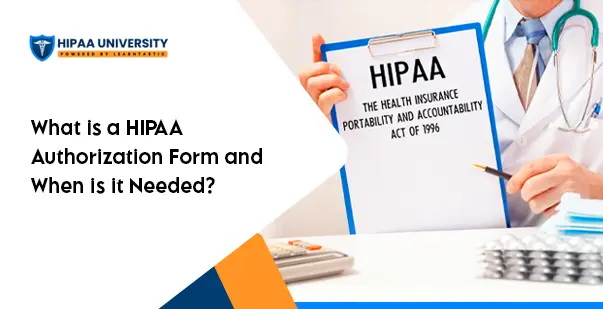What is a HIPAA Authorization Form and When is it Needed

September 2, 2024
HIPAA Authorization Forms are absolutely crucial for keeping patient privacy intact. They basically control how sensitive medical data gets shared. With all the new technology popping up in healthcare, these forms have become even more important.
Digital solutions have definitely replaced a lot of older, traditional ways of doing things. This shift has made things super efficient, but it also means there’s a higher risk of data breaches. Just think about it: in the United States, around 34.9 million people faced a data breach in 2020 alone, and that number keeps climbing every single year.
Patients, frankly, often find these forms confusing. It can be genuinely hard to understand exactly what they’re saying “yes” to. For healthcare providers, making sure everything is compliant is a complex job. One little mistake can lead to big legal issues or massive data breaches. In a world where “Data is the new currency,” protecting patient information isn’t just nice to have; it’s vital.
This blog post will explore why HIPAA Authorization Forms are so necessary, what they require, and exactly when you need to get them signed. On top of that, we’ll dive into how these forms protect patient data and why they’re simply essential in today’s healthcare environment.
What is the HIPAA Privacy Rule?
The HIPAA Privacy Rule first took effect on April 14, 2001. Its main goal is pretty clear: to protect medical records and Protected Health Information (PHI). These protective measures are put in place so that data can still move freely among authorized individuals and for essential healthcare activities.
It also gives individuals the right to access their own medical data that healthcare facilities have created and stored. This privacy policy acts as a shield, protecting that data from various hackers and malware that are constantly trying to steal it for harmful purposes.
What is the HIPAA Authorization Form?
The rules of HIPAA actually make it a requirement to get an authorization signed by a covered entity before any personal data gets used. Now, the privacy rules do ensure that doctors, hospitals, nurses, laboratory technicians, and other associated members of the healthcare industry can share PHIs (protected health information) without the patient’s direct permission for treatment purposes.
However, the HIPAA Authorization Form, often called the “HIPAA release form,” is a specific document that an individual signs for their healthcare provider. They sign it before the entity uses or uncovers their PHI for things other than just treatment, like operations, payment, and a few other specific purposes.
When an individual agrees to the regulations outlined in HIPAA authorization forms, they are essentially giving their compliance to the HIPAA-covered entity. This compliance permits them to use the patient’s PHI for various goals, all aimed at better and more efficient treatment and tracking.
What is the Purpose of the HIPAA Authorization Form?
The primary purpose of these HIPAA forms is straightforward: to get permission from patients to use their data.
The HIPAA privacy policy makes sure that everyone involved with the healthcare industry is generally restricted from using patients’ personal information.
So, this authorization form gives those associates permission to use the PHIs for things beyond just treatments.
Here’s an important point: the patient has the power to revoke this form at any time after signing it. Some common reasons why HIPAA authorization forms are signed include allowing the use of PHI in injury claims, or granting access to healthcare agents who might negotiate treatment charges.
Another reason could be giving access to some organizations that are helping with the bill payment process. Usually, even when access is provided, the patient’s information still remains protected.
Healthcare providers always focus on maintaining the “minimum necessary” standard. This means they only provide access to the information absolutely required to complete a specific goal.
- In some cases, patients might sign the form to allow their health information to be used in legal proceedings.
- Authorization may be required to share health information with insurance companies for coverage determination or claims processing.
- When health information needs to be shared with third parties, like employers or schools, this form is used to get the patient’s consent.
- Employers might request access to an employee’s health information for job-related purposes, such as fitness-for-duty evaluations. Authorization is definitely required for this disclosure.
- In certain instances, health information might be shared with public health authorities with the patient’s authorization for reporting purposes, such as tracking contagious diseases.
🔗 Read More: How Long is PHI Protected After Death
What Are the Requirements of the HIPAA Authorization Form?
To comply with HIPAA laws, certain specific elements absolutely must be included in the authorization form. Here are some key requirements:
Specific data to be used: The form needs to clearly spell out the exact information that will be disclosed. This helps patients truly understand how much of their information is being exposed.
Identification of the authorized individual: It’s super important to know exactly who has the authority to share the data. This allows for tracing the source if a data breach ever occurs, making investigations much more efficient.
Identification of third parties: It’s equally important to know which third parties are responsible for receiving the data. This builds trust between patients and healthcare providers.
Purpose of the disclosure: Patients need to know why their data is being shared, and healthcare providers must clearly state the precise purpose of the data use.
Expiration date of data use: Patients should be informed about when the authorization expires. After this date, the data can’t be used or disclosed any further. This gives patients clarity on exactly how long their data will be in use.
Signature and date: The patient’s signature and the date are crucial. Without them, the form is simply invalid. Patients should always carefully read all the terms before signing.
Other important elements to consider include:
Right to revoke authorization: Patients can revoke the authorization if they feel their data is being misused. They have the power to cancel the agreement to stop any further data sharing.
Exceptions to revocation rights: Patients also have the right to revoke conditions related to third parties. Exceptions can sometimes arise, and patients have the right to revoke these as well.
These are the fundamental requirements for HIPAA authorization forms. They’re all about ensuring patient safety and data protection.
Use of Data Beyond HIPAA Rules
HIPAA typically restricts how personal health information (PHI) can be used. However, with an authorization form, healthcare facilities actually gain permission to use this information in ways that aren’t usually allowed by the standard HIPAA privacy rules. Think of the form as a “permission slip” for using data for purposes beyond just treatment.
Marketing and Promotional Use
If a healthcare facility wants to use personal data for marketing, they absolutely must get authorization first. It’s really important to let patients know if their data will be used for marketing or promotions, especially if money or other benefits are involved. Patients have to approve this specific use of their information.
When Authorization Is Not Needed
There are, however, some cases where prior authorization simply isn’t required:
Face-to-Face Talks: If the healthcare provider is talking to the patient directly, face-to-face, no authorization is needed.
Small Promotional Gifts: If the communication involves giving out small promotional items, authorization isn’t necessary.
Public Health Activities: Health information can be shared without authorization to report diseases or vital events (like births or deaths).
Judicial and Administrative Proceedings: In certain situations, health information can be shared without permission if it’s in response to a court order or subpoena.
Law Enforcement Purposes: Health information can be shared with law enforcement without patient authorization when specifically required by law.
Emergencies: In true emergencies, when getting authorization isn’t possible, health information can be shared to provide necessary medical care or prevent a serious threat.
These rules help ensure that patients’ personal information is used appropriately, even in these special circumstances.
🔗 Read More: What is Considered Protected Health Information (PHI) Under HIPAA?
What Information Must a HIPAA Authorization Contain to be Valid?
The validity of a HIPAA Authorization truly depends on whether its key elements are valid. If these core components are valid, the entire agreement holds up. Here are some of those key elements:
Clear Description of Data: The form must clearly describe what exact type of data will be disclosed. This helps patients understand precisely what information is being shared.
Identity of the Authorized Person or Group: The form should clearly identify who has the authority to disclose the information. This is super important if any legal issues pop up, as patients will know exactly whom to contact.
Names of Third Parties: The form must name the specific third parties who will be requesting the information. This is critical for tracing the source of any problems if issues arise.
Purpose of Disclosure: The form should clearly state why the information is being disclosed. This really helps maintain trust between healthcare providers and patients, as patients will know how their data is actually being used.
Expiration Date: The form should include an expiration date. This tells patients exactly when their data will no longer be used, giving them a sense of security.
When Is HIPAA Authorization Needed?
HIPAA authorization is required in very specific situations where a healthcare provider or entity needs to use or share a patient’s health information. This goes beyond just regular care, payment, or healthcare operations. Here’s when authorization becomes necessary:
Marketing: Authorization is needed if a provider wants to use health information for marketing purposes, such as promoting a product or service that isn’t directly related to the patient’s care.
Selling Health Information: Authorization is required if health information is being sold. The patient must expressly consent to any exchange of health data for money.
Psychotherapy Notes: Special authorization is needed before sharing psychotherapy notes, which are very personal and typically kept separate from the regular medical record.
Research: If health information is used for research that doesn’t fall under certain specific exemptions, the patient’s written authorization is required.
Disclosures to Third Parties: Patient authorization is required if health information is shared with third parties not involved in direct care, payment, or operations.
These are the key situations when HIPAA authorization is definitely needed. Sharing health information without proper authorization would, simply put, violate HIPAA rules.
Secure Your Practice with HIPAA Training
Learning the steps it takes to attain HIPAA certification can seem daunting at first. But once you understand just how important it is to be certified, and all the benefits it brings to your organization, it will truly seem like the best choice. Earning a certification doesn’t just mean your reputation will grow; it also ensures your staff will be well-equipped to handle any mishaps along the way.
HIPAA Authorization Forms are key to protecting patient privacy. By truly learning about HIPAA, you can build trust with patients, manage data safely, and avoid legal issues. Taking a HIPAA compliance course will give you the skills you need to handle these challenges with confidence. Protect your patients, your practice, and your future.





